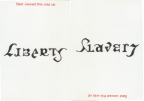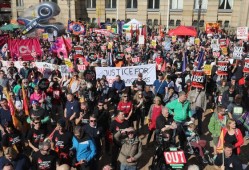I had the great honour in September to present a paper on the radical republicanism of the poet Percy Bysshe Shelley and how it influences my political activity. I reproduce it here.
Reclaiming Percy Bysshe Shelley’s Radical Republicanism
1. Introduction
A number of works have analysed Percy Bysshe Shelley’s (PBS) poetry from a proto-left viewpoint (e.g. Paul Foot 1981*). This paper, however, considers the issue of Shelley’s radical political philosophy with specific attention to Republican principles.
Clearly, PBS could have known nothing about socialism or communism. So any analysis based solely on these principles risks misrepresenting fundamental points of his ideology. Viewing his work within a contemporary setting not only brings his political concepts on liberty into focus but reveals a surprisingly strong relevance to current concepts of republicanism. Over the past 40 years researchers such as Quentin Skinner have revealed aspects of republican thinking lost to us for two centuries whilst others have set about the task of evolving them for the 21st Century. When PBS was at the height of his powers liberalism was starting this process of marginalizing republicanism but Thomas Paine and William Godwin, amongst others would have exerted a strong influence on Shelley.
To illustrate the points, the paper focusses on two of Shelley’s poems where the republican vision is most highly developed, Mask of Anarchy and Poetical Essay on the Existing State of Things along with the sonnet England in 1819.
2. What is Republicanism?
In popular conception Republicanism has become synonymous with anti-Monarchism. But its history and development is vastly richer and it is more accurate to characterise it as ‘anti-Slavery’. The seeds date back over two and a half thousand years when the Roman Republic was established following the defeat of the ruling Tarquin Kings in 509BCE. Indeed our modern word is derived from the Latin res publica meaning ‘public matter or affair’. The early Roman republic bears little similarity to our current idea of Republicanism but we, along with PBS, owe a great debt of gratitude to that great statesman and lawyer Marcus Tullius Cicero (106BCE-43BCE) for codifying the fundamental tenets. Predictably for a society heavily dependent on slavery it was important to define just what a constituted a free person. It is this formulation as an individual free from domination which provides a golden thread right from that era, through Shelley’s time to the present day.
The goal of early Republicanism was to establish the political; system which most effectively liberated citizens to protect their city-state. But around four hundred years ago a significant mutation occurred and republicans began to reformulate the ideas of non-domination explicitly in terms of citizen rights.
So how can we characterise modern republicanism? Professor Stuart White of Jesus College Oxford suggests four overarching principles:
1. Individual freedom defined as not living at the mercy or largesse of another (the famous nondomination doctrine).
2. An economic and social environment promoting and serving the Common Good.
3. Popular sovereignty, appropriately inclusive of all citizens and excluding oligarchic rule.
4, Inclusive and widespread civic participation by citizens.
I shall show how each of these principles are present in the works by PBS under consideration. These ideas were radical in the early eighteenth century and, I argue, are still radical today.
3. Freedom as Non-Domination; Core Republicanism
At the heart of republican philosophy lies a definition of freedom as non-domination or the absence of the condition of slavery. Non-domination is a far stricter doctrine than non-interference which forms the basis of liberal and libertarian ideology. Non-domination asserts that not only must an individual or group be free from arbitrary influence by another, but further, there must be no possibility of such influence. This guards against the benevolent master condition who allows his slaves latitude and possibly wealth, but could change his attitude at any moment. It is in these terms of slavery which PBS grounded his idea of liberty. So in the Mask of Anarchy we find:
What is Freedom? Ye can tell
That which Slavery is too well,
For its very name has grown
To an echo of your own.
The late Paul Foot in The Poetry of Protest asserted that slavery is economic exploitation. For a republican this is a narrow and incomplete view which fails to take into account the myriad other ways which slavery can occur, for example gender oppression which concerned PBS. Again in Mask of Anarchy we find:
‘Tis to be a slave in soul
And to hold no strong control
Over your own wills, but be
All that others make of ye.
4, The economic and social environment
But republicans do agree with socialists that sufficient economic resources are essential to individual freedom. At first, however, republicans took a hardline stance. Cicero, for example, says this in de officiis:
..vulgar are the means of livelihood of all hired workmen whom we pay for mere manual labour, not for artistic skill; for in their case the very wage they receive is a pledge of their slavery.
But as the Industrial Revolution evolved along with the concept of the Free Contract, wage-earning per se was not viewed as slavery in itself but rather the lack of agency to contest the conditions of the contract. This is what concerned PBS and economic hardship is a frequent theme in the works under consideration.
Poetical Essay makes explicit the association of economic hardship with autocratic rule in pursuit of glory and treasure in war:
But that the comfort, which despotic sway
Has yet allowed, stern War must tear away
In Mask of Anarchy no less than thirteen stanza’s deal with economic oppression, these being typical:
Tis to work and have such pay
As just keeps life from day to day
In your limbs, as in a cell
For the tyrants’ use to dwell,
and later
Tis to see your children weak
With their mothers pine and peak,
When the winter winds are bleak,
They are dying whilst I speak.
5. Popular Sovereignty
A popular misconception is to mistake republicanism for populism, but the relationship between democracy and the republic is a complex and subtle one which is reflected by PBS. To start with he expounds the basic principle:
Let a vast assembly be,
And with great solemnity
Declare with measured words that ye
Are, as God has made ye, free
(Mask of Anarchy)
This is being true to its ‘res publica’ root, ultimate sovereignty must rest with the people and PBS is demanding what we today might call a citizens constitutional convention though in reality we recognize that not everyone can physically take part in a single assembly.
But if freedom is exercised through an assembly then:
To the rich thou art a check,
When his foot is on the neck
Of his victim, thou dost make
That he treads upon a snake.
(Mask of Anarchy)
PBS is reminding us of the vital aspect of republican democracy, namely its key role in political accountability and a primary restraint on power. We can ‘throw the devils out’ as the Americans might say.
Writing about Parliament in England in 1819, however, he asserts:
A senate, Time’s worst statute, unrepealed
Are graves from which a glorious Phantom may
Burst, to illumine our tempestuous day.
The word ‘unrepealed’ is carefully chosen. For over two thousand years political theorists have wrestled with a central problem of popular sovereignty, namely demagoguery. The raising of mobs bedevilled Republican Rome and has been instrumental in the rise of authoritarians of various kinds including fascists, oligarchs and, possibly, orange hotel billionaires. So PBS was clear that power must be centred in an assembly rather than exercised on the streets which is why the terminology is exact. Consistent with a republican belief in a nation of laws, unrepealed implied Parliament must be reformed by a legitimate successor assembly not destruction by an armed mob. It was the same concern which exercised the leaders of the English revolution in 1649.
6. Inclusion and Justice

While contestable popular sovereignty is a central pillar of republicanism, PBS was well aware that there were practical barriers to a genuinely inclusive society. Even if the immediate aim of a greatly enlarged franchise was achieved there still remained the issue of policy development and the ability of the wealthy and privileged to mount legal challenges to Government. In Poetical Essay he says:
For justice, poisoned at its source, must yield
The power to each its shivered sword to wield,
To dash oppression from the throne of vice,
To nip the buds of slavery as they rise.
True to his republican principles, PBS was aware there is no point in abolishing the tyranny of monarchy while allowing others to persist or new ones to arise. All minority groups must have a say in how they were governed. Catholic oppression was often in PBSs mind, while religious dissenters such as Unitarians were the victims of constant attacks. But in Mask of Anarchy PBS perhaps surprisingly chooses a different group, being technically a numerical minority:
Those prison halls of wealth and fashion.
Where some few feel such compassion
For those who groan, and toil, and wail
As must make their brethren pale
So the point is clear. Even if you are a member of the aristocracy you are fully welcome to participate in the new society if you so choose. No popular dictatorship here.
7. StreetShelley and MusicShelley
Though the ideas which Shelley articulated had their roots in civilizations two thousand years earlier, they were radical and relevant. While it would be churlish and simply incorrect to claim that nothing had changed in the passage of a mere two hundred years since PBSs time, the concepts are, depressingly, hardly less radical today. Although I articulate my republican convictions in many ways, writing for online journals and blogging for example, two ways of delivering the message are particularly exciting.
First is what I call StreetShelley where I take to the streets in popular demonstrations with a megaphone and tracts of Shelley’s poetry. Because the ever shifting noisy bustle of a protest makes it impossible to recite a complete poem such as Mask of Anarchy I have become adept at selecting suitable extracts. This is made easier as a result of Shelley’s mastery of form, tension and release providing an unusual way of analysing his work.
Secondly as a member of the electro-acoustic experimental group Transgression we have been able to develop what we call ImprovShelley. We are currently working on a three part piece with the first movement dedicated to PBSs work, the second movement utilizing Parliamentary reports on appalling working conditions as text and a third movement looking at some modern day republican poets in the UK Midlands.
8. Conclusion
This paper has considered the radical republican ideas in just three of Shelley’s poetical pieces. His prose works include even greater elucidations of his principles, far beyond the scope of this short paper. I have no way of knowing what Shelley would have thought about my use of his material. Certainly the concept of free improvised music with live electronic sampling and manipulation would have been inconceivable, unless one took the ideas of Francis Bacon’s New Atlantis seriously! I have briefly outlined just some of the ways in which reclaiming the radical republicanism of Percy Bysshe Shelley helps informs many of my activities. I work towards the day when his ideas of the common good, genuinely inclusive institutions and widespread civic participation in our constitutional affairs are no longer regarded as radical but the necessary foundations of a modern, compassionate and inclusive society. Like Charlie ‘Bird’ Parker and Buddy Holly, for me PBS lives!
- Foot, P (1981) Red Shelley Bookmarks